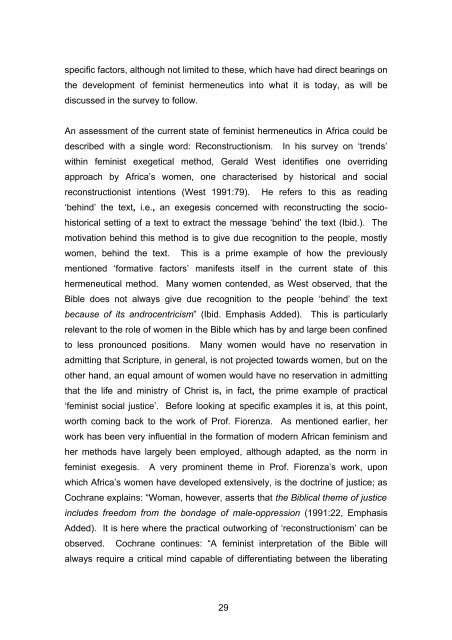African Hermeneutics: The Current State - Theology In Africa
African Hermeneutics: The Current State - Theology In Africa
African Hermeneutics: The Current State - Theology In Africa
Create successful ePaper yourself
Turn your PDF publications into a flip-book with our unique Google optimized e-Paper software.
specific factors, although not limited to these, which have had direct bearings on<br />
the development of feminist hermeneutics into what it is today, as will be<br />
discussed in the survey to follow.<br />
An assessment of the current state of feminist hermeneutics in <strong>Africa</strong> could be<br />
described with a single word: Reconstructionism. <strong>In</strong> his survey on ‘trends’<br />
within feminist exegetical method, Gerald West identifies one overriding<br />
approach by <strong>Africa</strong>’s women, one characterised by historical and social<br />
reconstructionist intentions (West 1991:79). He refers to this as reading<br />
‘behind’ the text, i.e., an exegesis concerned with reconstructing the socio-<br />
historical setting of a text to extract the message ‘behind’ the text (Ibid.). <strong>The</strong><br />
motivation behind this method is to give due recognition to the people, mostly<br />
women, behind the text. This is a prime example of how the previously<br />
mentioned ‘formative factors’ manifests itself in the current state of this<br />
hermeneutical method. Many women contended, as West observed, that the<br />
Bible does not always give due recognition to the people ‘behind’ the text<br />
because of its androcentricism” (Ibid. Emphasis Added). This is particularly<br />
relevant to the role of women in the Bible which has by and large been confined<br />
to less pronounced positions. Many women would have no reservation in<br />
admitting that Scripture, in general, is not projected towards women, but on the<br />
other hand, an equal amount of women would have no reservation in admitting<br />
that the life and ministry of Christ is, in fact, the prime example of practical<br />
‘feminist social justice’. Before looking at specific examples it is, at this point,<br />
worth coming back to the work of Prof. Fiorenza. As mentioned earlier, her<br />
work has been very influential in the formation of modern <strong><strong>Africa</strong>n</strong> feminism and<br />
her methods have largely been employed, although adapted, as the norm in<br />
feminist exegesis. A very prominent theme in Prof. Fiorenza’s work, upon<br />
which <strong>Africa</strong>’s women have developed extensively, is the doctrine of justice; as<br />
Cochrane explains: “Woman, however, asserts that the Biblical theme of justice<br />
includes freedom from the bondage of male-oppression (1991:22, Emphasis<br />
Added). It is here where the practical outworking of ‘reconstructionism’ can be<br />
observed. Cochrane continues: “A feminist interpretation of the Bible will<br />
always require a critical mind capable of differentiating between the liberating<br />
29


